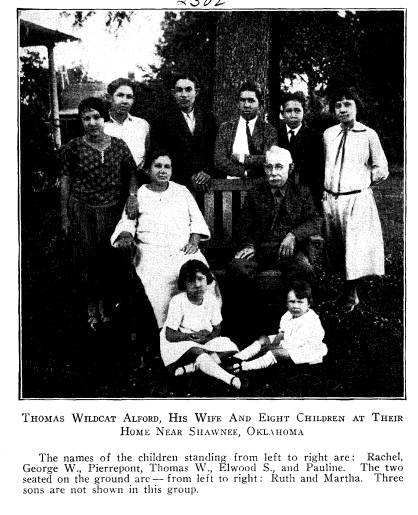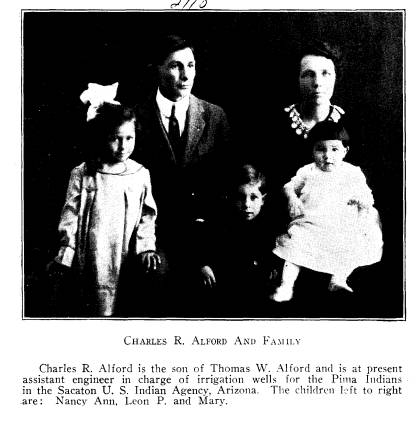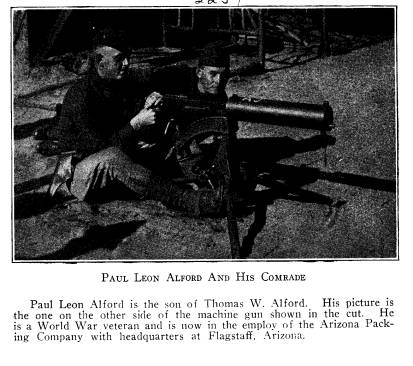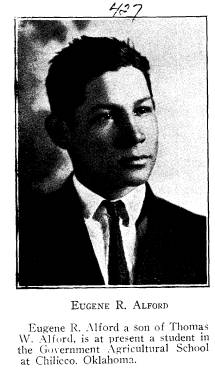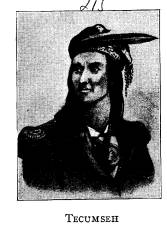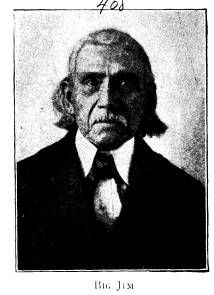Ohio History Journal
TECUMSEH AND HIS DESCENDANTS
BY C. B. GALBREATH
Much has been written of the famous
Shawnee
Indian chief Tecumseh who was born in
Clark County,
Ohio, in a village near the site of
Springfield, and who
died leading his braves in the battle
of the Thames,
Canada, where the Americans under
William Henry
Harrison signally defeated the combined
forces of the
British and their Indian allies.
Nothing remains to
be said of this natural born leader of
his race, but those
who have read the story of his exploits
will be interested
to know something of his descendants.
Sprague, in his description of the
American Indians,
made familiar to the schoolboy of Ohio
sixty years
ago, declared, "As a race, they
have withered from the
land," and the casual reader will
be a little surprised
to learn that there are numerous
descendants of Tecum-
seh still living and that the present
chief of the Ab-
sentee Shawnees is the great-grandson
of Tecumseh.
Through the kindness of Thomas Wildcat Alford,
another great-grandson of Tecumseh, who
was present
at the dedication of the George Rogers
Clark monument
on the old battlefield of Piqua near
Springfield last
August, we are able to present in
outline some basic
information in regard to the descendants
of Tecumseh,
together with illustrations that will
be of special in-
terest to Ohioans because of the
intimate relation of
this Shawnee chieftain and his tribe to
the pioneer his-
tory of the Northwest Territory and the
first state
carved from it. Following is the
outline as furnished
by Mr. Alford:
(143)
|
144 Ohio Arch. and Hist. Society Publications Tecumseh, the famous Shawnee chieftain, who was born in Ohio in 1768 near the present site of Spring- field, was killed in the battle of the Thames, Canada. Tecumseh left a son Nay-thah-way-nah who died in 1840. His wife, So-com-se, died in 1867. To them were born six children as follows: |
|
|
|
Tecumseh and His Descendants 145 1. Way-lahsk-se, who died in 1869. She was the wife of Ga-tah-ke-pea-se-ka, or George Wildcat Alford, who died in 1887. 2. May-thahsk-se, twin sister of Way-Iahsk-se, was killed by a horse in infancy about 1827. 3. Nah-swah-pa-ma, who married Nocks-kah-way. Both died some years ago. Dates not given. 4. Pa-se-quah-mea-se, who died in 1857. She mar- ried, first, Kyan-thaw-tah, who died in 1850. She then married, second, Na-he-pam-tha, who died in 1860. 5. Wal-kos-ka-ka, or Jim Fry, who died in 1865. |
|
|
|
146 Ohio Arch. and Hist. Society Publications He married, first, Pah-ke-pea-se, who died September 23, 1880. He afterward married, second, Cha-ney-qua, who died in 1866, or 1867. 6. Big Jim or Wah-pah-meap-to, who died in Mexico September 30, 1900. He married, first, Ma- tho-tay-se, who died in 1876. He afterward married Lah-wep-pea, who died in August, 1891. The descendants of these grandchildren of Tecum- seh were as follows in the order of their names above: 1. To Way-lahsk-se and her husband were born Nancy Hood, or Ah-la-maw-pa-ma, now living at the age of 67 years; Thomas Wildcat Alford, or Ga-nwah- pea-se-ka, now living at the age of 64 years; David W. Alford, or Pay-me-tah-pea-se-ka, who died September |
|
|
|
Tecumseh and His Descendants 147 28, 1900, leaving one child; Nellie Hood, or Nah-wah- taw-pea-se, now living at the age of 59 years. 3. To Nah-swah-pa-ma, and her husband was born Nav-cah-twah, who died March 4, 1892 and left three children -- Webster Tyner, Lucy Ellis and William Ellis. 4. To Pa-se-quah-mea-se, and her first husband was born Wayl-way-wa-se-ka, or Thomas Washington, who died June 22, 1906 and left several children now living. To Pa-se-quah-mea-se and her second husband was born one child, Ala-lay-maw-pea, who died in 1890 at the age of 35 years. 5. To Wal-kos-ka-ka and his first wife were born |
|
|
|
two sons Way-wa-lah, or Sam Fry, who d ed Aug. 12, 1879 and James Fry, who died January 6, 1875. To Jim Fry and his second wife was born one son, Joe Longhorn, who died November 2, 1896, and left a number of children who are still living. 6. To Big Jim and his first wife were born two children, To-tom-mo, or Little Jim, now living, age 52; and Lo-pa, or Lah- lah- wah- pea- se, who died February 20, 1909. |
|
148 Ohio Arch. and Hist. Society Publications Her husband, Charley Bob and one child, a daughter, survive her. In order to place before the readers of the QUAR- TERLY some additional authentic information we quote from the Handbook of American Indians, prepared by the Bureau of American Ethnology and published by the Smithsonian Institution, the biographical sketch of
TECUMSEH Tecumseh (properly Tikamthi or Tecumtha: "One who passes across intervening space from one point to another," i. e. springs (Jones); the name indicates that the owner belongs to the gens of the Great Medicine Panther, or Meteor, hence the interpreta- tions ("Crouching Panther" and "Shooting Star"). A cele- brated Shawnee chief, born in 1768 at the Shawnee village of Piqua on Mad river, about 6 m. s.w. of the present Springfield, Ohio. It was destroyed by the Kentuckians in 1780. His father who was also a chief, was killed at the battle of Point Pleasant in 1774 (see Cornstalk). His mother is said to have been by birth a Creek, but this is doubtful. It must be remembered that a considerable body of Shawnee were domiciliated among the Creeks until long after the Revolution. On the death of his father, |
|
|
|
Tecumseh was placed under the care of an elder brother, who in turn was killed in battle with the whites on the Tennessee frontier in 1788 or 1789. Still another brother was killed by Tecumseh's side at Wayne's victory in 1794. While still a young man Tecumseh distinguished himself in the border wars of the period, but was noted also for his humane character, evinced by persuading his tribe to discontinue the practice of torturing prisoners. Together with his brother Tenskwatawa the Prophet (q. v.), he was an ardent opponent of the ad- vance of the white man, and denied the right of the Government to make land purchases from any single tribe, |
|
on the ground that the territory, especially in the Ohio valley country, belonged to all the tribes in common. On the re- |
Tecumseh and His Descendants 149
fusal of the Government to recognize
this principle, he undertook
the formation of a great confederacy of all the western
and south-
ern tribes for the purpose of holding the Ohio river as
the perma-
nent boundary between the two races. In
pursuance of this ob-
ject he and his agents visited every
tribe from Florida to the
head of the Missouri river. While
Tecumseh was organizing
the work in the south his plans were
brought to disastrous over-
throw by the premature battle of
Tippecanoe under the direction
of the Prophet, Nov. 7, 1811. On the
breaking out of the War of
1812,
Tecumseh at once led his forces to the
support of the
British, and was rewarded with a regular
commission as brigadier-
general, having under his command some
2,000 warriors of the
allied tribes. He fought at Frenchtown.
The Raisin, Ft. Meigs,
and Ft. Stephenson, and covered
Proctor's retreat after Perry's
decisive victory on Lake Erie, until,
declining to retreat Meigs,
he compelled Proctor to make a stand on
Thames river, near the
present Chatham, Ontario. In the bloody
battle which ensued
the allied British and Indians were
completely defeated by Har-
rison, Tecumseh himself falling in the
front of his warriors, Oct.
5, 1813, being then in his 45th year.
With a presentiment of death
he had discarded his general's uniform
before the battle and
dressed himself in his Indian
deerskin. He left one son, the
father of Wapameepto, alias Big Jim (q.
v.) From all that
is said of Tecumseh in contemporary
record, there is no reason to
doubt the verdict of Trumbull that he
was the most extraordinary
Indian character in United States
history. There is no true por-
trait of him in existence, the one
commonly given as such in
Lossing's War of 1812 (1875) and
reproduced in Appleton's
Cyclopedia of American Biography (1894)
and Mooney's Ghost
Dance (1896), being a composite result
based on a pencil sketch
made about 1812, on which were mounted
his cap, medal, and
uniform.
In the same work is found a brief sketch
of his
grandson,
BIG JIM
Big Jim. The popular name of a noted
full-blooded Shawnee
leader, known among his people as
Wapameepto, "Gives light as
he walks." His English name was originally Dick Jim,
cor-
rupted into Big Jim. He was born on the
Sabine reservation,
Texas, in 1834, and in 1872 became chief
of the Kispicotha band,
commonly known as Big Jim's band of
Absentee Shawnee. Big
Jim was of illustrious lineage, his
grandfather being Tecumseh
and his father one of the signers of the
"Sam Houston
|
150 Ohio Arch. and Hist. Society Publications |
|
|
|
treaty," between the Cherokee and affiliated tribes and the Republic of Texas, Feb. 23, 1836. He was probably the most conservative member of his tribe In the full ab- original belief that the earth was his mother and that she must not be wounded by till- ing of the soil, he refused un- til the last to receive the al- lotments of land that had been forced upon his band in Okla- homa, and used every means to overcome the encroach- ments of civilization. For the purpose of finding a place where his people would be free from molestation, he went to Mexico in 1900, and while there was stricken with small- pox in August and died. He |
|
BIG JIM was succeeded by his only son, Tonomo, who is now (1905) about 30 years of age.
In the fifteenth edition of Drake's The Aboriginal Races of America, on page 624, is found the statement that "in 1826 the only living son of Tecumseh, whose name is Puchethei, which signifies crouching or watch- ing his prey left Ohio to settle beyond the Mississippi." In Lives of Famous Indian Chiefs by Norman B. Wood, page 358, is found the statement, "The name of Tecumseh's son was Pugeshashenwa." Other works give the same name. This son at the time of the death of his father was said to be seventeen years old and the intimation is that he was an only son. In his carefully prepared monograph Tecumseh, The Shawnee Chief, (Ohio Archaeological and His- torical Society Publications Vol . XV page 497). Mr. |
Tecumseh and His Descendants 151
E. O. Randall says: "A grandson
of Tecumseh, son
of Pugeshashenwa was known as Big
Jim. He was
chief of the Absentee Shawnees, located
in Oklahoma.
He died in Mexico, August, 1901. A
great-grandson
of Tecumseh, grandson of Pugeshashenwa
(by a sister
of Big Jim) was Thomas Washington, who
was also
an Absentee Shawnee chief. He visited
the President
at Washington in 1901."
It will therefore be seen that there is
something of
a confusion in regard to the name of the
son of Tecum-
seh from whom those named in this
contribution trace
their descent.
It is interesting to learn from Mr.
Alford that To-
tom-mo, or Little Jim, the son of Big
Jim and the great-
grandson of Tecumseh is at present the
chief of the
Absentee Shawnees.
Recently a writer living in Oklahoma
has thus de-
scribed one branch of the ancestry of
Thomas Wild-
cat Alford:
Many, many years ago a wandering band of
Indians stole
a little girl from an English settlement
in the east. The child
was adopted by the wife of the chief,
who had no children of
her own, and treated kindly. After a
time she learned to love her
captors dearly and played happily with
the little Indian children.
After a period of years when a peace
treaty with the Gov-
ernment compelled the Indians to
relinquish all their prisoners,
the child was restored to her own
people. She was then a maiden
of fourteen years and she pined for her
foster parents and the
wild free life of the Indians.
Finally she ran away from her own
people, and using all
the cunning she had learned during her
life with the Indians,
traveling only at night, hiding during
the day, eating whatever
food she could find, swimming streams,
enduring unspeakable
hardships, after many weary weeks she
reached the Indian vil-
lage again.
Her foster mother, the wife of the
chief, had grieved so
bitterly over the loss of her adopted
daughter that she was
152 Ohio Arch. and Hist. Society Publications
prostrated. For many days she had
refused to partake of food,
and faithful watchers beside her couch
believed that she was
quite near death, when the young girl
returned and they were
happily reunited. The foster mother
became well at once.
That little English girl was the
great-grandmother of Thomas
Wildcat Alford.
He was born in the Indian Territory,
near Sasakwa, in the
year 1860. When about twelve years old he was sent to the
Shawnee Mission school, then under the
supervision of the
Society of Friends, to whose religious
training and influence Mr.
Alford attributes the principles that
have guided his life.
His father and mother died when he was
quite young and
he was left to the guardianship of his
uncle, Big Jim, who was
then chief of the Shawnee tribe, and
like many other Indian
chiefs, had a deep respect for learning
and wisdom and en-
couraged the lad in his pursuit of
learning. When he was nine-
teen years old, through the influence of
the Philadelphia organi-
zation of the Society of Friends and by
the advice of the mis-
sionary to the Indians, he was sent to a
military academy at
Hampton, Virginia.
In a letter just received from Mr.
Alford he states
that the sketch from which the above
quotation is made
is essentially correct. His statement in
regard to the at-
titude of Big Jim is interesting and is
here quoted al-
most entire:
Big Jim during his lifetime was always
opposed to any change
from the old Indian ways of life, was
always wide awake to the
thoughts of the white man in regard to
the Indian, so as to en-
able him to resist or to answer him in
all things. He at times
undoubtedly realized that he was
handicapped for lack of the
white man's education, for he had to
have an interpreter when-
ever he talked to a white man.
So when the good people from the east,
together with the
trader who was then among these Indians,
discussed education
and urged the chiefs to send their
children east to be educated,
two boys were selected from each of the two principal clans
of the Shawnees and sent to Hampton
Institute, Virginia, to be
educated. One of these two boys was John
King of the Thah-
we-gi-lah clan and the other was myself
of the Peck-ku-we-tha
clan. Just a few days before we started
for the east, Uncle
Big Jim and Uncle Joe Ellis, chiefs of
the Shawnees, visited us
Tecumseh and His Descendants 153
about dusk. John and I were rather
startled, because we sensed
that they undoubtedly came on our account and at such a
time
with no one with them. They came
silently in single file from
the west. After repast -- and it was
then quite dark -- they
called us under a large tree where we
sat down on the ground,
There they recalled to us their desire
to send us to school and
encouraged us to do the best we could to
learn all the wisdom
of the white man, in order that when we
came back we should
know how to answer every attempt of the
white man to ruin the
Indian, when we should occupy the seats
that they then occupied
and direct the interests of our people
as they were now doing,
But under no circumstances were we to
accept the white man's
religion. Uncle Big Jim addressed me
directly and Uncle Joe
my friend John King. John King and I
accepted the obligation
which tended to hold us back and cost us
much misery during
our school days, as you may judge, until
we conquered by the
light of God through the good and
earnest efforts of our teach-
ers who were so anxious to improve the
Indian in a higher
life. So, strange to say, we both
violated our obligation, and
others became chiefs in our stead, but
without any regret on our
part.
Now this was long ago and my bosom
friend John King
left me twenty-five years ago and went
to the happy hunting
ground -- a friend truly
he was--and left a wife and one little
girl nine months old whom I took as my
own and raised to
womanhood. The name of this little
girl--the only descendant
living of my friend--is Etta King, now
Etta King Stacey, hav-
ing been married after completing her
education in the city of
Shawnee, Oklahoma. She lives in the state of Arizona at the
present time.
As will be seen from the group picture
on another
page Thomas W. Alford has a large and
interesting
family. Four sons and four daughters
are shown in
the group. Three sons were absent at
the time it was
taken. He therefore has all told eleven
children. Two
of his sons are World War veterans.
